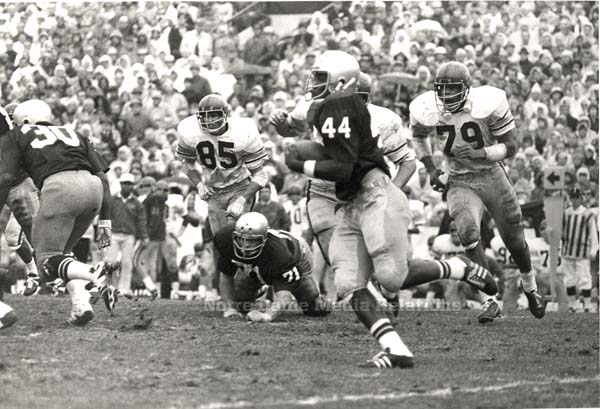(Photo: Notre Dame Archives)
Eric Penick died on April 16 due to complications from clostridioides difficile (c.diff) which he contracted during a hospital stay. He was 71-years-old.
As Notre Dame’s starting running back in 1973, Penick scored two of the most important touchdowns in the storied history of Notre Dame football. Penick’s legacy extends far beyond the gridiron.
Penick was born in Cleveland, Ohio, on September 21, 1953. Growing up black during the Civil Rights era, Penick was grounded by his family, including his mother, Bertha; step father, Thomas; sister, Mosetta; step brother, Tommy; aunts; uncles; and grandparents.
“I did not grow up rich, but I was well-rounded,” Penick wrote in his autobiography A Notre Dame Man: The Life, Lore and Runs of Eric Penick. “My childhood was filled with education, sports, religion, and music.”
Penick went to high school at prestigious Gilmour Academy on their “Interracial Scholarship.”
Penick excelled academically, and athletically. He won an unprecedented five sprinting state championships (the 100-yard dash and the 220-yard dash as a junior; the 100-yard dash, the 220-yard dash and the 440-yard dash as a senior). As a senior running back, Penick rushed for over 2,000-yards and was named an All American by just about every national ranking.
“Going to [Gilmour Academy} was my favorite time in life,” Penick wrote.
There was not a college in the country that did not want Penick to play football for them. Once he received a scholarship offer from Notre Dame, though, the decision was clear.
“Notre Dame is recruiting you,” Penick’s mother said. “You aren’t going anywhere else.”
He entered Notre Dame as the school’s most heralded recruit ever.
Penick became Notre Dame’s starting running back in 1972. The 5-11, 210-pounder finished the regular season as the team’s top rusher, gaining 727-yards on 124 carries (5.9-yards-per-carry) and scoring five touchdowns. His 727-yards on the ground was the second most in Irish history at the time.
The 1973 Notre Dame team was stacked with talent. They had one big problem, though. The Irish simply could not beat USC. They had not beaten the Trojans in six years, including losing three consecutive games.
That changed on October 27, 1973, in South Bend.
With 11:25 remaining in the third quarter, Notre Dame had a 13-7 lead with the ball on their own 15-yard-line.
On Notre Dame’s first offensive play of the second half, Penick took a handoff. He picked up numerous blocks and burst through the line of scrimmage. At the 33-yard-line, Penick did a small stutter step on a defensive back and broke an arm tackle without slowing down.
And then, he was gone.
“The only thing I saw was open field and the goal line out before me,” Penick wrote.
Penick reached the end zone and was mobbed by Irish fans and teammates.
Powered by Penick, the Irish beat the Trojans, 23-14.
After an undefeated regular season, Notre Dame met undefeated Alabama in the Sugar Bowl, in what was effectively the National Championship Game.
With just over two and a half minutes remaining in the third quarter, the Crimson Tide led the Irish 17-14. Notre Dame recovered a fumble and returned it to the Alabama 12-yard-line.
In the pivotal moment of the most captivating college football game ever played, legendary Irish coach Ara Parseghian gave Penick the ball. No one knew that earlier in the third quarter, Penick had fractured his left ankle. It did not matter. Once he had the ball in his hands, Penick would not be denied. He went 12-yards, untouched into the endzone.
The run helped carry the Irish to a 24-23 victory and the 1973 National Championship.
Penick finished his junior season with 586-yards on 102 carries (5.7-yards-per-carry) and scored seven touchdowns.
Penick’s ankle never fully healed from the Sugar Bowl. During spring practice that year, he was tackled, and the ankle broke clean through.
“I was never again the same running back, nor the same man,” Penick wrote.
Penick played only sparingly in 1974. He finished his Notre Dame career with 1,327-yards on 238 carries (5.6-yards-per-carry) and 12 touchdowns in the regular season. He also gained 84-yards on 18 carries (4.6-yards-per-carry) and scored an additional touchdown in bowl games. His Irish teams went a combined 29-5 from 1972-1974.
Even with his injured ankle, Penick had enough potential that he was a late round draft pick by the Denver Broncos. He played in the 1975 NFL preseason, but no longer had the burst of speed he had once had, and did not make the final roster.
Penick used his Economics major at Notre Dame to become a successful businessman, working a variety of corporate jobs.
Penick married three times. The last time, he got it right with Sandra Poole, who he would remain married to for 37-years until her death from lung cancer in 2018.
“Sandra was my heart,” Penick wrote.
Penick had eight children: Erica; Eric Paul; Mikel-Claire; Jewel; Eric Jr. (Tony); Krystal; Amber; Jade. He became a grandfather, and even a great grandfather.
“You love a kid so much that they become the essence of what you are,” Penick wrote. “Having a child is the greatest thing you will ever do.”
One of the most remarkable things about Penick is how many people truly loved him. He was charismatic and kind and had more friends than anyone you are likely to meet. Penick simply drew people to him. His friends included Notre Dame running back Al Samuel, who called Penick on the phone every single day.
Like many people, Penick lost touch with his faith for a time. Once he found it again, though, it became the guiding force in his life. Raised in both the Catholic and Baptist faiths, Penick identified as non-denominational. He became a preacher, spreading the word of God at places like the Dallas Youth Village.
Penick was diagnosed with diabetes in 2019. The disease combined with vascular problems from his broken ankle which was a very bad combination.
In 2022, Penick got very sick. He eventually had his left leg amputated above the knee.
Losing his leg was devastating for a sprinter and running back. But Penick faced the challenge with grace and courage. He moved to Michigan to live with his daughter, Jewel and her family. He went to physical therapy multiple times a week. He continued praying and preaching. He also began writing his autobiography.
Penick looked at A Notre Dame Man: The Life, Lore and Runs of Eric Penick as a legacy piece for his children and grandchildren. The book would go on to stay on the bestseller list for eight months.
In October of 2023, Penick returned to Notre Dame for the 50th anniversary of the 1973 National Championship.
That night, before the game against USC, Penick and his teammates went down onto the field.
Wearing his prosthetic leg, Penick braced himself on his walker. Using all of his strength and all of his faith in God, Penick raised himself up and stood upon the Notre Dame football field one final time.
Just over 18-months later, following a hospital stay, Penick was gone. Passing away during Holy Week, just before Easter.
Penick was a Notre Dame Man. Above all, though, Eric Penick was a good man.
“I am no longer afraid to die,” Penick wrote. “I understand that my love for God and my obedience to Him will bring me to the Kingdom of Heaven. I will be happy. I will exist in joy. I will walk with the Lord. And just maybe, if He deems it, I will run with the Lord.”
Stephen Alexander is the son of Eric Penick’s Notre Dame teammate and linebacker, Drew Mahalic. He co-authored Eric’s autobiography, “A Notre Dame Man: The Life, Lore and Runs of Eric Penick” available on Amazon.com, here.
For more on Penick on Fighting Irish Preview see: Penick to Join ’73 Championship Reunion, 1970’s Irish Hero Eric Penick Hospitalized, USC Memory-Eric Penick Goes Long and 70’s ND Star Pens Autobiography

